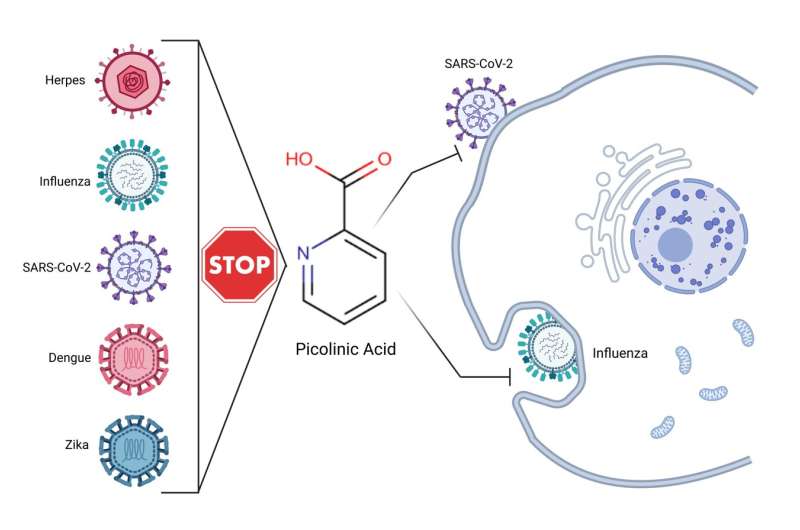This article has been reviewed according to Science X's editorial process and policies. Editors have highlighted the following attributes while ensuring the content's credibility:
fact-checked
peer-reviewed publication
trusted source
proofread
Study unveils picolinic acid's broad-spectrum antiviral abilities

Picolinic acid, a natural compound produced by mammalian cells, can block several disease-causing viruses such as SARS-CoV-2 and influenza A viruses, according to a new study by researchers at the Indian Institute of Science (IISc) and collaborators.
Published in Cell Reports Medicine, the study describes the compound's remarkable ability to disrupt the entry of enveloped viruses into the host's cell and prevent infection. The team hopes to develop the compound into a broad-spectrum therapeutic that can help fight against a variety of viral diseases.
Picolinic acid is known to help in the absorption of zinc and other trace elements from our gut, but in its natural form, it stays inside the body only for a short duration and is usually excreted out quickly. In recent years, scientists have begun noticing that it may also exhibit antiviral activity.
A few years ago, the IISc team began investigating endocytosis, a cellular process often co-opted by viruses and bacteria to enter our cells. During their investigations, the researchers stumbled upon picolinic acid and realized that the compound could slow down viral entry into host cells. Therefore, they decided to test the compound's antiviral potential.
"Coincidentally, the pandemic emerged during the study. So, we extended our research to examine its impact on SARS-CoV-2 and found it to be even more potent in this context," explains corresponding author Shashank Tripathi, Assistant Professor at the Department of Microbiology and Cell Biology (MCB) as well as the Center for Infectious Diseases Research (CIDR), IISc.
Notably, picolinic acid displayed a preference for blocking enveloped viruses. In addition to the usual protein coat found in all viruses, these enveloped viruses also have an extra outer membrane made of lipids derived from the host. This envelope is crucial for virus entry into its target cell. Incidentally, a majority of human viruses with high prevalence and pandemic potential are enveloped viruses.
During their entry into host cells, the virus envelope and the host cell membrane fuse, creating a pore through which the virus's genetic material enters the host cell and starts replicating. The researchers found that picolinic acid specifically blocks this fusion, which explains its effectiveness against a variety of enveloped viruses, including flaviviruses like the Zika virus and the Japanese encephalitis virus. The compound did not have much effect on non-enveloped viruses like rotavirus and coxsackievirus.
Usually, antiviral drugs target either the virus directly—which can sometimes lead to drug resistance—or some part of the host cell—which may lead to negative side-effects. "This compound, on the contrary, stands out because it falls in between … it is targeting a host-derived component of the virus," explains Tripathi.
"Since the viruses borrow this component from the host, they don't have the machinery to repair the damage to their envelope. So, with the same compound, you are damaging the virus permanently, while causing very transient minimal effect on the host cell with self-repair ability."
When the compound was tested in SARS-CoV-2 and influenza animal models, it was found to protect the animals from infection. It was also found to reduce viral load in the lungs when given to infected animals. In addition, the researchers found that picolinic acid led to an increase in the number of immune cells in the animals.
Rohan Narayan, Research Associate in CIDR and first author of the paper, says, "Our current focus is on enhancing the compound's efficacy, stability and absorption in the host body. We are seeking partnerships with pharmaceutical industries to facilitate its clinical development and use against present as well as impending viral outbreaks."
More information: Rohan Narayan et al, Picolinic acid is a broad-spectrum inhibitor of enveloped virus entry that restricts SARS-CoV-2 and influenza A virus in vivo, Cell Reports Medicine (2023). DOI: 10.1016/j.xcrm.2023.101127. www.cell.com/cell-reports-medi … 2666-3791(23)00255-0




















